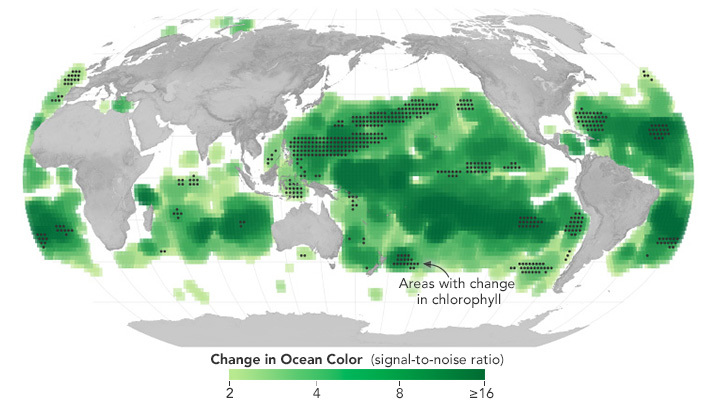
The once-dark blue ocean is gradually taking on a greener hue. The colour of the ocean's surface indicates the ecology just below it, so pay attention to it even if it doesn't seem as important as, say, record warm sea surface temperatures. Microscopic photosynthesizing creatures called phytoplankton form dense communities on the water's surface, essential to the aquatic food web and carbon cycle. This colour change in the water verifies a pattern predicted by climate change and indicates alterations to the ecosystems found in the world's oceans.
Scientists at the UK's National Oceanography Centre, led by B. B. Cael, found that the colour of 56% of the ocean's surface has changed significantly during the previous two decades. NASA's Aqua satellite's MODIS (Moderate Resolution Imaging Spectroradiometer) sensor collected ocean colour data, which they analyzed to determine that the change is largely due to the ocean becoming greener.
Darker hues of green on the chart above represent more substantial changes (higher signal-to-noise ratio) in ocean surface colour between 2002 and 2022. As a result, Cael stated, "These are places we can detect a change in the ocean ecosystem in the last 20 years." The study focused on tropical and subtropical regions, excluding higher latitudes, which are in the dark for part of the year, and coastline waters, where the data are typically quite noisy.
The black dots on the map show twelve percent of the ocean's surface, where chlorophyll levels also varied during the study period. The chlorophyll concentration has long been used by remote sensing scientists as a proxy for phytoplankton biomass and productivity. To be fair, those calculations only factor in a small subset of the colours we can see. The green numbers represent a more complete picture of the ecosystem because they are based on the full spectrum of hues.
Long-time series collected by a single remote sensing sensor is unusual. Cael was curious about the long-term trends that could be detected in the data as the Aqua satellite celebrated its 20th year in orbit in 2022, well beyond its 6-year design life. In particular, he wondered if there was anything the instrument might have overlooked in its exhaustive survey of ocean hue. He said that we are only scratching the surface of what is recorded in the data.
Extensive data analysis allowed the researchers to spot a trend in ocean colour predicted by climate models but was thought to require 30–40 years of data using satellite-based chlorophyll estimates. This is due to the fact that the trend of climate change is relatively small compared to the natural variability in chlorophyll. The new method considers all visible light and is reliable enough to confirm the trend after 20 years.
It's unclear at this time what ecological shifts are responsible for the new colours. The authors argue that different plankton communities, more detrital particles, and creatures like zooplankton are all possible causes. Since the hue shifts are not massively pervasive, Cael concludes they are not from items like plastics or other contaminants.
He said the ocean has become increasingly stratified over the past 20 years. Due to a warming environment, overheated surface waters are less likely to combine with deeper, nutrient-rich layers. In this case, plankton that can survive in low-nutrient conditions would thrive. Cael noted a correlation between places of shifting ocean hue and locations where the water has become more stratified. Still, he found no similar correlation between these phenomena and shifts in sea surface temperature.
There may soon be more information available about the water systems of Earth. Launching in 2024, the NASA PACE (Plankton, Aerosol, Cloud, ocean Ecosystem) satellite will provide sharper colour resolution for future studies. More insights into ocean ecology, such as phytoplankton species richness and growth rates, will be possible thanks to the additional data.



You must be logged in to post a comment.